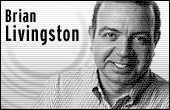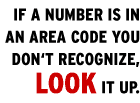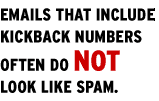| |||||||||

Be leery of tropical area codes
 If you receive an email asking you to dial a number in an area code you
haven't heard of, such as 809, check the location before you call. You
could save yourself from an unpleasant surprise. If you receive an email asking you to dial a number in an area code you
haven't heard of, such as 809, check the location before you call. You
could save yourself from an unpleasant surprise.Individuals typically receive an email saying they're entitled to money in an unclaimed bank account if they call a number like 809-474-nnnn (where n is any numeral). Businesses receive requests that they fax a price quote to a number like 664-410-nnnn. Such phone numbers look like any other in North America, where consumer-protection laws discourage unexpected charges from appearing on your bill. But island nations in the Caribbean--including the Dominican Republic (809) and Montserrat (664)--are not subject to U.S. or Canadian laws. Unwittingly calling or faxing to a pay-per-call number in these area codes could cost up to $25 per minute. Such a number is called an "international kickback number." The commercial promoter that charges you for the call pays part of the money to the local telephone company that owns the wires. Email messages that include kickback numbers often don't look like "spam," or unsolicited email. Because of the high profits that kickbacks make possible, it's feasible for an unscrupulous promoter to look up your name, address or other details and include them in a tailor-made message. But obvious spammers have sometimes included headlines in their junk email such as, "To be removed from our list, call 1-473-408-nnnn." The actual number, in Grenada, silently charged callers $2 per minute.
Memorizing the area codes involved would be difficult. But you can avoid
most unexpected charges by remembering a few rules of thumb: • 900 Numbers. Numbers in the 900 area code have been used for pay-per-call services in the United States and Canada for many years. Regulations of the U.S. Federal Trade Commission require 900-number operators to start calls with a recorded "preamble." This preamble must state a call's cost and inform the caller that no charge will be made if the caller hangs up immediately. It's important to note two big exceptions, however. A preamble is not required if the cost of the call is $2 or less. And no preamble is required for machine-to-machine connections, such as a link between two computers or fax machines. • 700 and 500 Numbers. Area codes 700 and 500 were created in the United States for "carrier-specific" services. And some telephone carriers offer free 700-number services that are actually useful. For example, calling 700-555-4141--a free call in the United States--tells you the name of the long-distance carrier serving the telephone line you are calling from. This can be useful to check whether your line's been "slammed," or switched without your permission to another long-distance carrier. But calls to area codes 700 and 500 may involve unexpected charges. Although 500-number calls were never intended for pay-per-call use, a loophole in the regulations allows promoters to silently forward calls to international kickback numbers. You won't hear a preamble informing you of the cost if your call is forwarded to a country where this isn't required. • Other area codes. If a number is in an area code you don't recognize, look it up in the Kickback Number Directory before you call. This directory is maintained by consulting company LincMad.com. It lists telephone prefixes that are set aside for pay-per-call services in the Caribbean and many other countries. Of course, not every telephone number in an unfamiliar area code is a pay-per-call number. Thousands of perfectly ordinary phone numbers exist in the Caribbean islands, and calling these numbers costs no more than your long-distance provider's usual international rates. But LincMad's directory is a quick way to make sure. Unless you're planning to dial a $3-a-minute phone-sex service, for example, you probably want to avoid numbers in Jamaica such as 1-876-468-nnnn (1-876-HOT-nnnn). Consumer advocate Brian Livingston appears at CNET News.com every Friday. Do you know of a problem affecting consumers? Send info to tips@BrianLivingston.com. He'll send you a book of high-tech secrets free if you're the first to submit a tip he prints. biography |
|
|||||||||||||||||||||||
|
Send us news tips | Contact Us | Corrections | Privacy Policy |
|

